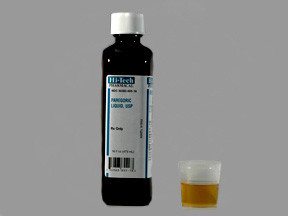PAREGORIC - ORAL
PHONETIC PRONUNCIATION: (PAR-e-GOR-ik)
GENERIC NAME(S): paregoric
Uses
USES: This medication is used to treat diarrhea. It helps to decrease how often you have bowel movements. It works by slowing the movement of the intestines. Paregoric belongs to a class of drugs known as opioid pain relievers, but this medication acts mainly to slow the gut.
How to use PAREGORIC - ORAL
HOW TO USE: Take this medication by mouth as directed by your doctor, usually 1 to 4 times daily. It may be taken with food or meals if stomach upset occurs. Shake the bottle well before each dose. Carefully measure the dose using a special measuring device/spoon. Do not use a household spoon because you may not get the correct dose. The dosage is based on your medical condition and response to treatment. Children's dosage is also based on weight. If you suddenly stop using this medication, you may have withdrawal symptoms (such as sweating, nausea, vomiting, restlessness). To help prevent withdrawal, your doctor may lower your dose slowly. Withdrawal is more likely if you have used paregoric for a long time or in high doses. Tell your doctor or pharmacist right away if you have withdrawal. Though it helps many people, this medication may sometimes cause addiction. This risk may be higher if you have a substance use disorder (such as overuse of or addiction to drugs/alcohol). Do not increase your dose, take it more often, or use it for a longer time than prescribed. Properly stop the medication when so directed. When used for a long time, this medication may not work as well and may require different dosing. Talk with your doctor if this medication stops working well. Diarrhea can sometimes cause a severe loss of body water (dehydration). It is important that you drink the proper amount of fluids and minerals (electrolytes) to prevent this effect. Tell your doctor right away if you develop signs of dehydration (such as unusual decreased urination, unusual dry mouth/thirst, fast heartbeat, or dizziness/lightheadedness). You may also need to change to a bland diet during this time to reduce irritation to your stomach/intestines. Consult your doctor or pharmacist for more information. Tell your doctor if your condition lasts or gets worse after 2 to 3 days of treatment.
Side Effects
Precautions
Interactions
Overdose
Images
Reviews
Faq for PAREGORIC - ORAL
Paregoric oral medication is commonly used to treat diarrhea in adults and children above 4 years old.
Paregoric has an antidiarrheal effect by slowing down the movement of the intestines and reducing bowel contractions. It also has a mild anesthetic effect on the intestinal lining, relieving cramping and discomfort.
Paregoric should be taken orally as directed by your doctor or according to the instructions on the medication label. It is usually taken every 4 to 6 hours as needed for diarrhea relief.
Yes, Paregoric may cause drowsiness or dizziness. It is advised to avoid driving, operating heavy machinery, or engaging in activities that require alertness until you know how the medication affects you. Pregnant women, nursing mothers, and individuals with liver or kidney disease should consult their doctor before using Paregoric.
Common side effects of Paregoric may include drowsiness, dizziness, lightheadedness, constipation, nausea, vomiting, and stomach pain. If any severe side effects such as shallow or slow breathing, fainting, or allergic reactions occur, seek immediate medical attention.
Paregoric is generally safe for children above the age of 4 years, but the dosage should be adjusted according to the child's weight and age. It is recommended to consult a pediatrician before administering Paregoric to a child.
Paregoric may interact with certain medications such as sedatives, tranquilizers, antihistamines, and other drugs that cause drowsiness. Inform your doctor about all the medications you are taking to avoid any potential drug interactions.
Paregoric is a prescription medication and is not available over-the-counter. You need a doctor's prescription to obtain it.
Paregoric generally starts working within 1 to 2 hours after taking it, providing relief from diarrhea symptoms.
Disclaimer
IMPORTANT: HOW TO USE THIS INFORMATION: This is a summary and does NOT have all possible information about this product. This information does not assure that this product is safe, effective, or appropriate for you. This information is not individual medical advice and does not substitute for the advice of your health care professional. Always ask your health care professional for complete information about this product and your specific health needs.

No Reviews Yet